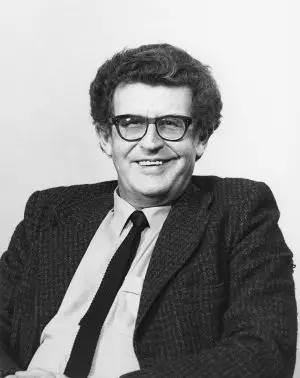Kenneth Minogue
Kenneth Robert Minogue (September 11, 1930– June 28, 2013) was an Australian conservative political theorist who was Emeritus Professor of Political Science and Honorary Fellow at the London School of Economics.[1][2]
Life
Minogue was born on September 11, 1930 in in Palmerston North, New Zealand.[2] He was educated in Australia,[2][3] attending Sydney Boys High School[4] and the University of Sydney, graduating in 1950.[5]
Kenneth Minogue died on June 28, 2013 on board a flight returning to Guayaquil, Ecuador from a meeting of the Mont Pelerin Society in Galapagos, Ecuador. [6]
Career
From 1955 to 1956 he taught at the University of Exeter, and from 1959 taught at the London School of Economics.[7]
Minogue wrote academic essays and books on a great range of problems in political theory. His 1963 book The Liberal Mind, about the perversion of the liberal label by radical leftists became popular internationally. Minogue argued that genuine liberalism rests on the tradition of thinkers like Adam Smith, Benjamin Constant, Adam Ferguson, Alexis de Tocqueville, John Stuart Mill et al., who built the foundation for a conservative perspective. Minogue defended civility, decency, and moderation against globalists and leftists, and advocated an honest and transparent public sphere where individuals can freely pursue their own ideas of happiness.
Minogue edited and introduced the Everyman's Library edition of Hobbes' Leviathan,[3] was a columnist for The Times and The Times Higher Education Supplement,[3] and contributed to The New Criterion and Daily Mail.[2][8] In 1976 he issued a report to help modernize Shiraz University in Iran.[3]
In 1986 Minogue presented a 6-part television program on Channel 4 about free market economics called The New Enlightenment.[3] He was Senior Research Fellow with the Social Affairs Unit in London.[3] He wrote a study on Maori-Pākehā relations (the latter is the Maori term for New Zealanders of European descent) for the New Zealand Business Roundtable which was published in 1998 published as Waitangi Morality Reality.[9]
From 1991 to 1993 Minogue was chairman of the euro-sceptic Bruges Group.[1][3] From 2000, he was a trustee of Civitas.[1] He served as President of the Mont Pelerin Society from 2010.[1] In 2003, he received the Centenary Medal from the Australian government.[1] He was also involved with the Centre for Policy Studies and the European Foundation.[1]
Major works
- The Liberal Mind. Liberty Fund,1963. ISBN 978-0865973084
- Nationalism. Basic Books, 1967. ASIN B0006BRF56
- The Concept of a University. Transaction Publishers, 1974. IBSN 978-0765808479
- Contemporary Political Philosophers. Routledge, 1976. ISBN 978-0416833706
- Alien Powers: The Pure Theory of Ideology. Intercollegiate Studies Institute, 1985. ISBN 978-1933859798
- Thatcherism: Personality and Politics. Palgrave Macmillan, 1987. ISBN 978-0333447253
- Politics: A Very Short Introduction. Oxford University Press, 1995. ISBN 978-0192853882
- Conservative Realism: New Essays in Conservatism. HarperCollins, 1996. ISBN 978-0002557696
- The Silencing of Society. Social Affairs Unit, 1997. ISBN 978-0907631736
- Waitangi: Morality and Reality. New Zealand Business Roundtable, 1998. ISBN 978-1877148361
- The Servile Mind: How Democracy Erodes the Moral Life. Encounter Books, 2010. ISBN 978-1594033810
Notes
- ↑ 1.0 1.1 1.2 1.3 1.4 1.5 "Prof Kenneth Minogue", Debrett's. Retrieved 2009-09-21.
- ↑ 2.0 2.1 2.2 2.3 Interview
- ↑ 3.0 3.1 3.2 3.3 3.4 3.5 3.6 Kenneth Minogue, Social Implications of a Global Economy Colorado College, February 6, 1999. Retrieved May 2, 2014.
- ↑ http://www.shsobu.org.au/wp-content/uploads/professors.pdf
- ↑ David Martin Jones, "The Conservative Mind of Kenneth Minogue", Quadrant, September 1, 2013: 20-25. Retrieved May 2, 2014.
- ↑ Roger Kimball, "Kenneth Minogue, 1930–2013" Roger's Rules, June 30th, 2013. Retrieved May 2, 2014.
- ↑ Vladimir Tismaneanu, "Premises of Liberty: In Memoriam Kenneth Minogue (1930-2013)" FrontPage Mag, July 2, 2013. Retrieved May 2, 2014.
- ↑ Kenneth Minogue, "Criminals counselled and family breakup rewarded: Labour's made niceness a State policy - and the result is a nastiness that's destroying Britain" The Daily Mail, March 30, 2009. Retrieved May 2, 2014.
- ↑ Kenneth Minogue Waitangi, Morality Reality, Wellington: New Zealand Business Roundtable, 1998. Retrieved May 2, 2014.
ReferencesISBN links support NWE through referral fees
External links
Credits
New World Encyclopedia writers and editors rewrote and completed the Wikipedia article in accordance with New World Encyclopedia standards. This article abides by terms of the Creative Commons CC-by-sa 3.0 License (CC-by-sa), which may be used and disseminated with proper attribution. Credit is due under the terms of this license that can reference both the New World Encyclopedia contributors and the selfless volunteer contributors of the Wikimedia Foundation. To cite this article click here for a list of acceptable citing formats.The history of earlier contributions by wikipedians is accessible to researchers here:
The history of this article since it was imported to New World Encyclopedia:
Note: Some restrictions may apply to use of individual images which are separately licensed.
